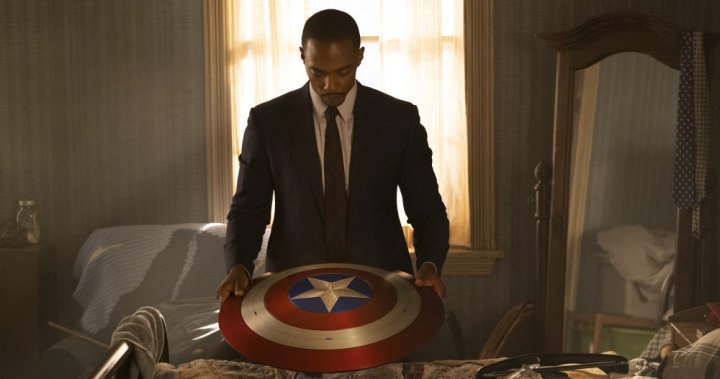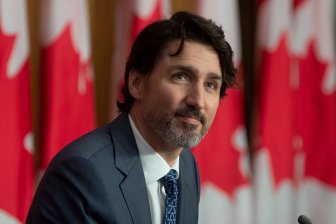Passing on a legacy is not always simple — especially when that legacy is Captain America‘s star-spangled shield, and especially when that shield is passing from a blond relic of the 1940s to a modern day Black hero.
Canadian director Kari Skogland says that evolution in heroism was at the heart of her approach to The Falcon and the Winter Soldier, Marvel’s six-episode streaming series that concludes on Disney+ this Friday. The show deals with the fallout of Steve Rogers retiring as Captain America in Avengers: Endgame, and his decision to hand his shield over to a reluctant Sam Wilson/the Falcon (Anthony Mackie).
Sam and Bucky Barnes/the Winter Soldier (Sebastian Stan) embark on their own adventure on the show while grappling with what it means to be a hero today — especially when the legacy of Captain America is not as squeaky-clean as they once thought.
Global News spoke to Skogland after the penultimate episode in the series, which sets up a finale with Sam Wilson taking up the shield and (likely) the title of Captain America, as he has previously done in the comics.
Global News: You’ve got five episodes in the bag and the finale is around the corner. It looks like we’re going to get a new Captain America, but we haven’t quite got there yet. How are you feeling now that this journey is almost complete?
Kari Skogland: I’m thrilled that we are being not only provocative as I had hoped we would be, but that people are embracing it and it’s provoking lots of thought. That’s exactly the whole goal: to move the needle a little bit. I think we’re going to accomplish that and that makes me extremely proud.
Take us back to the beginning. What was your pitch coming in, and what message did you want to highlight with this show?
I believe this is the most important show of the century. We were taking on a Black man picking up that shield and what that meant and what that was going to look like in a very racially charged time. That was a really important image to look at and to explore. We had to not pull any punches and really dig into it.
Falcon/Sam Wilson (Anthony Mackie), left, Director Kari Skogland and Sarah Wilson (Adepero Oduye) on the set of Marvel Studios’ THE FALCON AND THE WINTER SOLDIER exclusively on Disney+.
Chuck Zlotnick/Marvel Studios
I also wanted to explore what it means to be a hero today. The whole idea of Captain America was borne of a time 80-something years ago. That was a time of the Second World War, and it was an antifascist idea. You had this idea of it being a soldier-warrior. That was the construct for a hero.
But after 9/11, a hero was a first responder. A hero was not a warrior in the same way that it had been. And so for Captain America to present what a hero is in today’s times, where we look a lot at the grey zones and the evil guy doesn’t look evil, what is that? How do they get radicalized and how does a hero deal with that? I think we managed to tackle a whole bunch and I hope we’ve really torn it apart and looked at it.
Some of the most powerful moments in the show are ones that involve race. I’m thinking especially about a scene in Episode 2, when police effectively card Sam — a world-saving Avenger — and confront him simply because he’s Black. It’s a very awkward scene. How did that come together?
We wanted to show those parts of the Black experience wherever we could, because we have to see it to understand. We have to see a revered hero like Sam facing racism before our very eyes. That will help us understand and change. That’s just what has to happen. We just have to change.
You’re coming into this as one of Marvel’s first female directors and the first Canadian. How did that outsider perspective inform your approach to this conversation that’s so American?
I hold two passports and I’ve been living in the States for some time, but because of my Canadian background, I think I bring a bit of Switzerland to it. I can analyze it from a bit of a distance. And perhaps it’s even just my personality. I’m far more interested in listening to both sides and letting the audience decide so we don’t tie things up in a nice, neat bow. If we walk away thinking and having learned something, that as a filmmaker is what I set out to do.

Anthony Mackie and Sebastian Stan have played the Falcon and the Winter Soldier for years now. What was it like stepping in to direct these two who know their characters so well?
Fantastic. They’re exactly that. They’ve been living them, they know them, but what they hadn’t done was go home with them, so they were able to explore new sides to these characters that they’ve never explored. I think that was both exhilarating and completely frightening at the same time, because they wanted to get it right.
In particular, for Sebastian this was a big shift for his character. And now we’re not just going home with him, but we’re going to explore his deep-seated fears and his own yearning for relevance and trying to figure out how to go forward.
Director Kari Skogland, left, and Winter Soldier/Bucky Barnes (Sebastian Stan) on the set of Marvel Studios’ THE FALCON AND THE WINTER SOLDIER exclusively on Disney+.
Chuck Zlotnick/Marvel Studios
And we go home with Sam, and we discovered that the racism that he lives with every day, and his own family problems — he can’t solve that. You deal with the minutia problems that a superhero can’t deal with.
Speaking of the minutia of superhero life, let’s talk about the minutia of showing a supervillain — Baron Zemo — busting a move at a nightclub.
Daniel Bruhl’s dance became a standout moment on social media, and the “Dancing Zemo” supercut has over 10 million views online. What was it like to see that response?
Oh my God! Well of course we loved it when we were shooting it. And Daniel Bruhl is a very funny man. He plays all these very hard characters but he’s actually got a tremendous sense of humour.
We were able to do that because we were able to go home with the characters and take them off the road for a little bit. It was fun to see him, and I think that came naturally because we had set up this nightclub scene. He was just having a good time and he started doing his thing. It turned into a meme, and then Marvel put out a whole long take of it. It was great.
-—
[This interview has been edited and condensed.]
‘The Falcon and the Winter Soldier’ is a six-episode miniseries streaming now on Disney+. The show launched on March 19 and the final episode airs April 23.
© 2021 Global News, a division of Corus Entertainment Inc.


